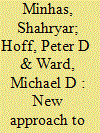| Srl | Item |
| 1 |
ID:
145703


|
|
|
|
|
| Summary/Abstract |
Previous models of international conflict have suffered two shortfalls. They tend not to embody dynamic changes, focusing rather on static slices of behavior over time across a single relational dimension. These models have also been empirically evaluated in ways that assumed the independence of each country, when in reality they are searching for the interdependence among all countries. A number of approaches are available now for analyzing relational data such as international conflict in a network context and a number of these can even handle longitudinal relational data, but none are developed to the point of exploring how networks can coevolve over time. We illustrate a solution to the limitations of existing approaches and apply this novel, dynamic, network based approach to study the dependencies among the ebb and flow of daily international interactions using a newly developed, and openly available, database of events among nations.
|
|
|
|
|
|
|
|
|
|
|
|
|
|
|
|
| 2 |
ID:
076876


|
|
|
|
|
| Publication |
2007.
|
| Summary/Abstract |
The authors examine a standard gravity model of international commerce augmented to include political as well as institutional influences on bilateral trade. Using annual data from 1980-2001, they estimate regression coefficients and residual dependencies using a hierarchy of models in each year. Rather than gauge the generalizability of these patterns via traditional measures of statistical significance such as p-values, this article develops and employs a strategy to evaluate the out-of-sample predictive strength of various models. The analysis of recent international commerce shows that in addition to a typical gravity-model specification, political and institutional variables are important. The article also demonstrates that the often-reported link between international conflict and bilateral trade is elusive, and that inclusion of conflict in a trade model can sometimes lead to reduced out-of-sample predictive performance. Further, this article illustrates that there are substantial, persistent residual exporter- and importer-specific effects, and that ignoring such patterns in relational trade data results in an incomplete picture of international commerce, even in the context of a well-established framework such as the gravity model
|
|
|
|
|
|
|
|
|
|
|
|
|
|
|
|